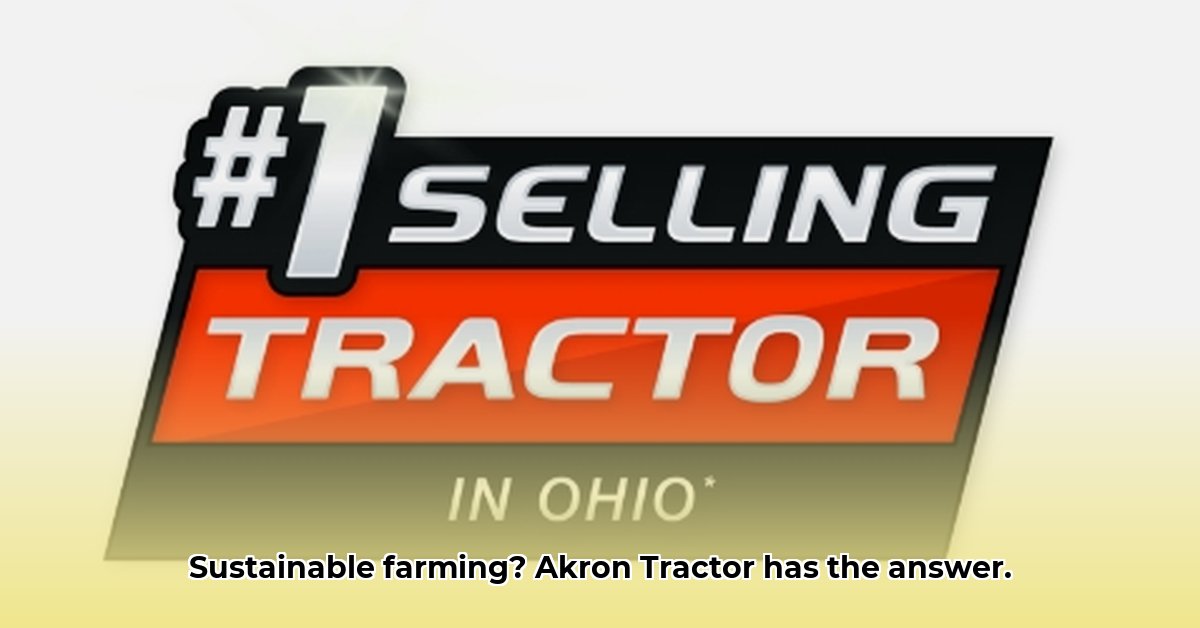
Akron Tractor & Equipment: A Case Study in Sustainable Agriculture Opportunities
Akron Tractor & Equipment (ATE) enjoys a strong reputation within the Akron, Ohio farming community, known for reliable equipment and service. However, its contribution to sustainable agriculture remains largely unquantified. This article assesses ATE's current practices, identifies data gaps, and offers actionable recommendations for the company, local farmers, sustainable agriculture organizations, and government agencies. For more examples of sustainable farming equipment, check out this helpful resource: Ohio Tractor Supply.
Company Profile: Akron Tractor & Equipment
ATE serves the Akron area's farming and landscaping sectors. While its reputation for quality service is well-established, a lack of readily available information limits a comprehensive assessment of its role in promoting sustainable agriculture. The company's website focuses primarily on parts and service, lacking detailed information on equipment inventory and sales data related to sustainability.
Assessment of Sustainable Practices: A Data Deficit
Determining ATE's impact on sustainable farming is challenging due to a significant lack of publicly available data. Critical information gaps exist, hindering a robust analysis:
- Equipment Inventory: The absence of a detailed equipment inventory prevents a precise analysis of the types and quantities of sustainable farming equipment offered (e.g., electric or hybrid tractors, fuel-efficient tillers, precision irrigation systems).
- Sales Data: Categorized sales data is crucial to understanding the market demand for and the company's provision of sustainable machinery. Year-over-year sales trends would highlight shifts in customer preferences and the effectiveness of any sustainability-focused strategies.
- Customer Engagement: Information about ATE's outreach efforts—workshops, training on sustainable equipment use, etc.—is lacking, hindering the evaluation of its proactive role in promoting these practices.
Actionable Recommendations: A Path Toward Sustainability
Bridging the data gap and fostering a more sustainable agricultural sector requires a multi-pronged approach:
Akron Tractor & Equipment: Publicly release a detailed equipment inventory, categorized by sustainability features. Implement a robust sales data tracking system to monitor the adoption of sustainable equipment. Invest in staff training on sustainable agricultural practices and launch educational initiatives for customers. (Short-term: 0-1 year; Long-term: 3-5 years).
Local Farmers: Actively seek out and purchase sustainable equipment. Advocate for increased availability of green technologies through direct engagement with ATE and other suppliers. Explore collaborative purchasing models to leverage economies of scale. (Short-term: 0-1 year; Long-term: 3-5 years).
Sustainable Agriculture Organizations: Collaborate with ATE to provide technical expertise and create training programs for farmers. Conduct research to identify barriers to sustainable equipment adoption and advocate for policy changes to support greener practices. (Short-term: 0-1 year; Long-term: 3-5 years).
Local/State Government: Implement tax incentives or grant programs to encourage the adoption of sustainable agricultural equipment by businesses. Invest in research and development of sustainable farming technologies and infrastructure. (Short-term: 0-1 year; Long-term: 3-5 years).
Conclusion: Unlocking the Potential for Sustainable Growth
ATE possesses considerable potential to become a leader in sustainable agriculture within the Akron region. Transparency in data reporting, proactive engagement with farmers and stakeholders, and a commitment to offering environmentally friendly equipment will be vital. A collaborative effort—involving ATE, farmers, sustainable agriculture organizations, and government—is needed to cultivate a more environmentally responsible and economically viable agricultural sector. The future of sustainable farming in Akron rests on seizing this opportunity.